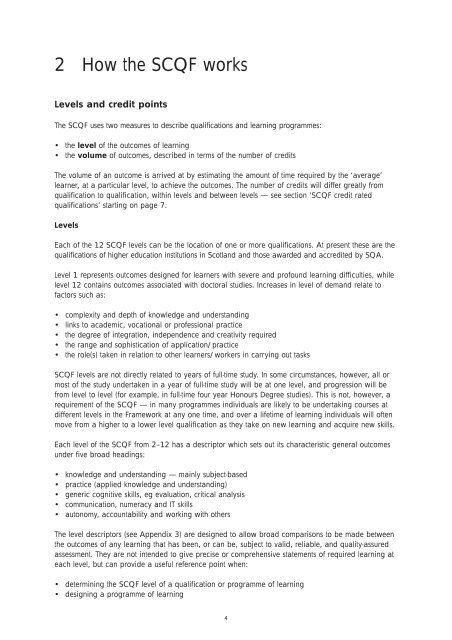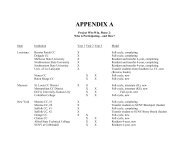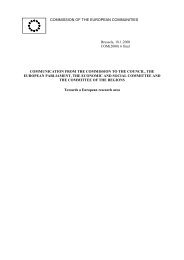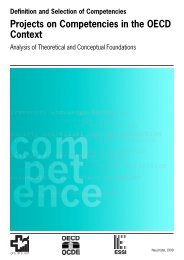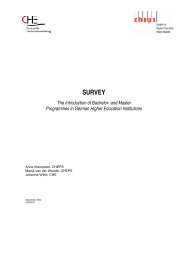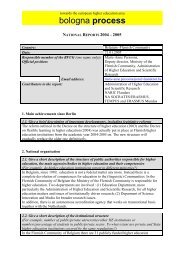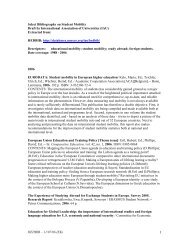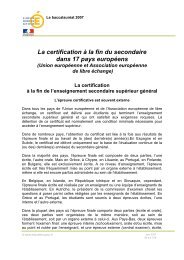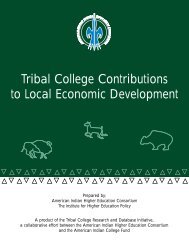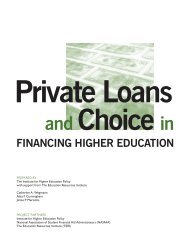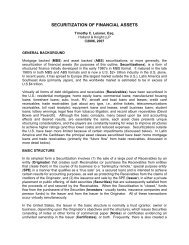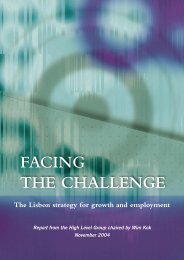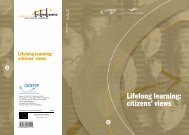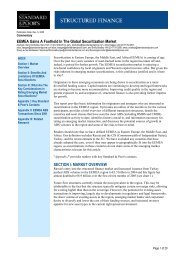An Introduction to the Scottish Credit and Qualifications Framework
An Introduction to the Scottish Credit and Qualifications Framework
An Introduction to the Scottish Credit and Qualifications Framework
Create successful ePaper yourself
Turn your PDF publications into a flip-book with our unique Google optimized e-Paper software.
2 How <strong>the</strong> SCQF works<br />
Levels <strong>and</strong> credit points<br />
The SCQF uses two measures <strong>to</strong> describe qualifications <strong>and</strong> learning programmes:<br />
• <strong>the</strong> level of <strong>the</strong> outcomes of learning<br />
• <strong>the</strong> volume of outcomes, described in terms of <strong>the</strong> number of credits<br />
The volume of an outcome is arrived at by estimating <strong>the</strong> amount of time required by <strong>the</strong> ‘average’<br />
learner, at a particular level, <strong>to</strong> achieve <strong>the</strong> outcomes. The number of credits will differ greatly from<br />
qualification <strong>to</strong> qualification, within levels <strong>and</strong> between levels — see section ‘SCQF credit rated<br />
qualifications’ starting on page 7.<br />
Levels<br />
Each of <strong>the</strong> 12 SCQF levels can be <strong>the</strong> location of one or more qualifications. At present <strong>the</strong>se are <strong>the</strong><br />
qualifications of higher education institutions in Scotl<strong>and</strong> <strong>and</strong> those awarded <strong>and</strong> accredited by SQA.<br />
Level 1 represents outcomes designed for learners with severe <strong>and</strong> profound learning difficulties, while<br />
level 12 contains outcomes associated with doc<strong>to</strong>ral studies. Increases in level of dem<strong>and</strong> relate <strong>to</strong><br />
fac<strong>to</strong>rs such as:<br />
• complexity <strong>and</strong> depth of knowledge <strong>and</strong> underst<strong>and</strong>ing<br />
• links <strong>to</strong> academic, vocational or professional practice<br />
• <strong>the</strong> degree of integration, independence <strong>and</strong> creativity required<br />
• <strong>the</strong> range <strong>and</strong> sophistication of application/practice<br />
• <strong>the</strong> role(s) taken in relation <strong>to</strong> o<strong>the</strong>r learners/workers in carrying out tasks<br />
SCQF levels are not directly related <strong>to</strong> years of full-time study. In some circumstances, however, all or<br />
most of <strong>the</strong> study undertaken in a year of full-time study will be at one level, <strong>and</strong> progression will be<br />
from level <strong>to</strong> level (for example, in full-time four year Honours Degree studies). This is not, however, a<br />
requirement of <strong>the</strong> SCQF — in many programmes individuals are likely <strong>to</strong> be undertaking courses at<br />
different levels in <strong>the</strong> <strong>Framework</strong> at any one time, <strong>and</strong> over a lifetime of learning individuals will often<br />
move from a higher <strong>to</strong> a lower level qualification as <strong>the</strong>y take on new learning <strong>and</strong> acquire new skills.<br />
Each level of <strong>the</strong> SCQF from 2–12 has a descrip<strong>to</strong>r which sets out its characteristic general outcomes<br />
under five broad headings:<br />
• knowledge <strong>and</strong> underst<strong>and</strong>ing — mainly subject-based<br />
• practice (applied knowledge <strong>and</strong> underst<strong>and</strong>ing)<br />
• generic cognitive skills, eg evaluation, critical analysis<br />
• communication, numeracy <strong>and</strong> IT skills<br />
• au<strong>to</strong>nomy, accountability <strong>and</strong> working with o<strong>the</strong>rs<br />
The level descrip<strong>to</strong>rs (see Appendix 3) are designed <strong>to</strong> allow broad comparisons <strong>to</strong> be made between<br />
<strong>the</strong> outcomes of any learning that has been, or can be, subject <strong>to</strong> valid, reliable, <strong>and</strong> quality-assured<br />
assessment. They are not intended <strong>to</strong> give precise or comprehensive statements of required learning at<br />
each level, but can provide a useful reference point when:<br />
• determining <strong>the</strong> SCQF level of a qualification or programme of learning<br />
• designing a programme of learning<br />
4


